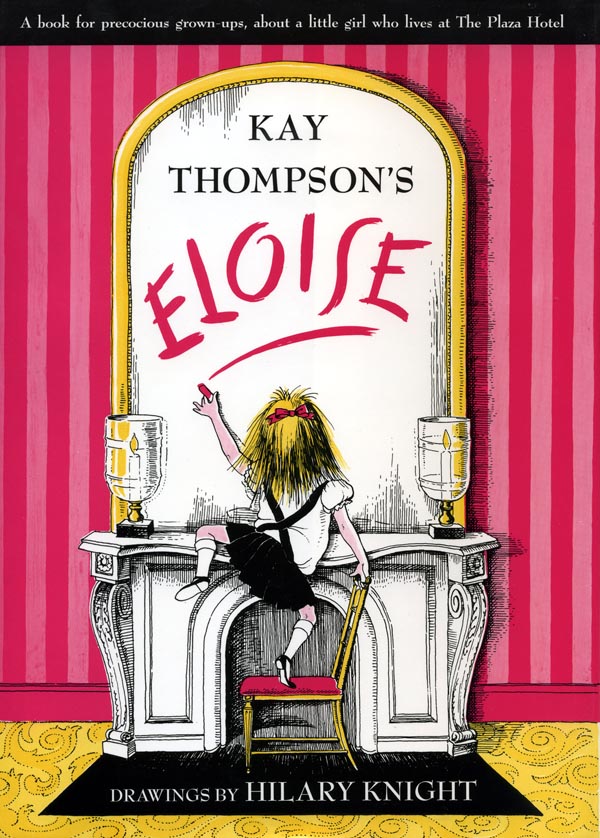
BIBLIOGRAPHY
Thompson, Kay, and Hilary Knight (illustrator). Eloise. New York: Simon & Schuster Books for Young Readers, 1955. ISBN 9780671223502
PLOT SUMMARY
In Eloise, a mischievous 6-year-old takes readers through her daily routine at her ritzy home, the Plaza Hotel in New York City. Readers are introduced to the lobby, where Eloise is dubbed a “nuisance”; the elevator, where she provokes the elevator man by “skibbling” up and down tirelessly; the hall, where she makes “a really loud and terrible racket” for the other residents; and various fancy rooms that are left a little less fancy in the wake of little Eloise. The 6-year-old also introduces readers to her pets, her nanny, her French teacher, and her wild imagination. Most of all, readers are introduced to Eloise’s big, often impish personality from the first page to the last.
CRITICAL ANALYSIS
Loud, opinionated, and very unique, Eloise is a picture book character like no other. Readers will never have to guess how Eloise feels about anything or anyone, whether it’s her boring boring boring French tutor Philip whom she mimics until he screams, or her nurse, Nanny whom ooooooo she just absolutely loves. Eloise’s voice is full of made up words and childlike observations (did you know that Kleenex makes a very good hat and so does cabbage leaf and an egg cup?), making her voice strong and certainly unforgettable, despite the simple, meandering plot of the story. Illustrations support and strengthen text with spreads as unforgettable as the one where readers watch Eloise saw Saylor the doll in half and ride in an ambulance to save the poor thing from this most terriblest accident.
However, while the voice and illustration of Eloise are to be lauded, the book often seems too mature for its 5- to 8-year-old audience. In fact, Kay Thompson herself never intended for this book to be a children’s book. It was intended, as its subtitle suggests, to be a book for precocious grown-ups. Children may not pick up on the illustration of the gin that 6-year-old Eloise has stashed away in her room, but they will hear the somewhat offensive mature phrases “for Lord’s sake” and “Oh my Lord” repeated about a dozen times. And while characters that are overly cute, sweet, and well behaved may not be memorable to children and didactic texts can turn them right off, Eloise seems to have no meaning nor subtle takeaway, unless it is that Eloise is actually a character to be pitied. She’s a 6-year-old whose parents are completely absent and whose mischievous acts seem to be the only way she knows how to get anyone’s attention. Or maybe the takeaway is that her naughtiness holds no undesirable consequences, an idea that caregivers may not be thrilled to have to correct.
AWARDS AND REVIEW EXCERPTS
New York Times Bestseller List
Times “100 Best Children’s Books of All Time” List
Bookroo “Best 100 Classics of All Time” List
From Time: “She is a magnificent moppet.”
From the New York Times: “Eloise is one of the most recognizable characters in children’s literature.”
From Variety: “Eloise is poised to become an overnight sensation.”
CONNECTIONS
Read with other popular children’s books written in the 1950s:
- Geisel, Theodor Suess. The Cat in the Hat. ISBN 9780394800011
- Johnson, Crockett. Harold and the Purple Crayon. ISBN 9780747532033
Read with other picture books with strong character voice:
- Willan, Alex. Unicorns Are the Worst!. ISBN 9781534453845
- Pizzoli, Greg. The Watermelon Seed. ISBN 9781423171010
- Lobel, Arnold. Frog and Toad Are Friends. ISBN 9780064440202
Read with other picture books that include elevators:
- Minh, Lê, and Dan Santat (illustrator). Lift. ISBN 9781368036924
- Kulling, Monica, and David Parkins (illustrator). Going Up!: Elisha Otis’s Trip to the Top. ISBN 9781770495166
- Frankel, Yael, and Kit Maude (translator). The Elevator. ISBN 781734783902
Read with other picture books about the day in the life of a child:
- Viorst, Judith, and Ray Cruz (illustrator). Alexander and the Terrible, Horrible, No Good, Very Bad Day. ISBN 9780689711732
- Falconer, Ian. Olivia. ISBN 9780689829536
*Note—This book review was created as an assignment for a course at Texas Woman’s University.